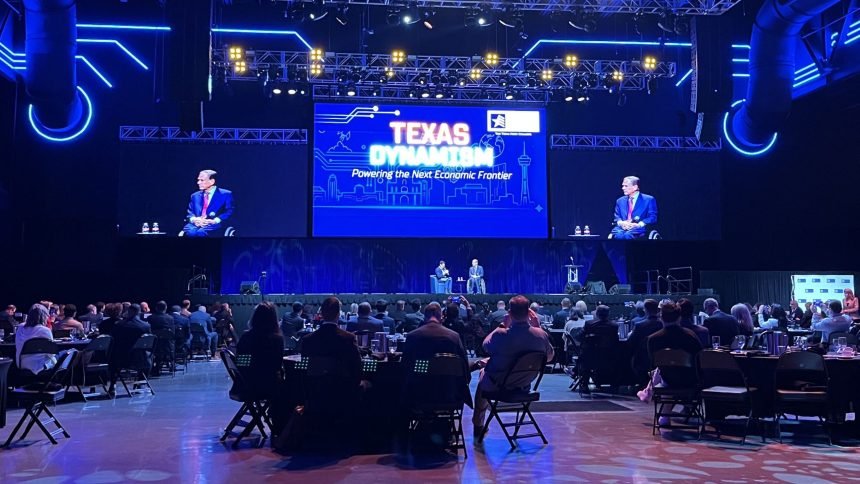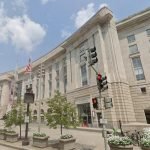Space travel and cyber warfare may have once been confined to novels and movie screens, but for state leaders, those concepts are now less science fiction and more a growing industry.
Texas is investing in commercial space flight and cybersecurity — and San Antonio is trying to increase local involvement and opportunity in both sectors.
The Greater San Antonio Chamber of Commerce announced plans to host a Texas Space Summit in 2026, bringing together the Texas Space Commission and companies from around the state to discuss the space industry.
Later that day, space commission and state officials gathered at the Texas Association of Business’s event at the Boeing Center, where Port San Antonio President Jim Perschbach made a pitch to bring more U.S. cybersecurity operations to the former Kelly Field.
Bringing that government investment to San Antonio would draw more employers and jobs to the city, Perschbach said.
“If we have that work here, it’s solidified in San Antonio, it is a whole lot easier for us to attract those employers,” he said. “As we track those employers, we drive up the income in San Antonio, we create job opportunities.”
Where will cybersecurity investment go?
Gov. Greg Abbott established Texas Cyber Command in San Antonio this year, a $135 million effort to protect state resources from cyberattacks. The agency is partnering with University of Texas-San Antonio and is currently housed in its downtown campus.
Abbott gave an update on those efforts Tuesday at the Texas Association of Business event.
“We are building out the facilities, and it’s going to be fully functional and operational in and around the downtown area,” he said. “It’s going to be a remarkable asset for San Antonio, for the state of Texas, and a necessary tool as we continue to fight these ongoing battles at home and abroad.”
Perschbach also renewed his pitch this week for a $1 billion campus for the U.S. Air Force’s cyber operations at Port San Antonio.
“We are going to build a campus for the United States Air Force to consolidate not just the electronic missions, but the missions that are so important to our national security,” he said. “We can build that campus for over a billion dollars, less than the United States government can build it, but we can deliver it in four to six years.”
Abbott dealt a blow to those efforts earlier this year.
The Texas Legislature had set aside $50 million for that campus after the U.S. Air Force indicated some interest in the proposal, but Abbott vetoed the spending when the budget hit his desk this summer.
The U.S. Air Force focuses on national defense while Texas Cyber Command focuses on in-state cybersecurity, and Abbott called the $50 million proposal duplicative of his cyber command efforts.
The governor didn’t address the question while in San Antonio on Tuesday.
Bringing the space industry to town
The Texas Space Summit won’t take place until September 2026, but local leaders are trying to position San Antonio to take advantage of statewide investment in the commercial space industry and jobs that could come with it.
Commercial space giants like SpaceX and Blue Origin both have launch facilities in Texas, giving the state an advantage in a growing industry, said Jeff Webster, the CEO and president of the Greater San Antonio Chamber of Commerce.
The chamber is hosting the 2026 summit at the Henry B. Gonzalez Convention Center and plans to make it an annual event, Webster said. The event could bring 2,000 local and international attendees and boost convention and tourism spending.
Businesses that attend the event would also get a firsthand look at San Antonio and the city’s existing infrastructure at places like Brooks and Port San Antonio, Webster added.
“We’re going to give people a chance to learn the San Antonio story, the Texas story,” he said. “This is absolutely one of the emerging business opportunities and economic development opportunities in our great state.”
At Texas Dynamism, a speaker series hosted by the Texas Association of Business at the Boeing Center on Tuesday, Texas Space Commission Executive Director Norman Garza said the agency had been given $300 million for grants from the state legislature to boost those commercial space efforts.
Garza said the commission had received 280 applications for funding and given out 22 grants so far. He added that none of the grantees were from San Antonio, but there were plenty of applications from the area.
Garza noted San Antonio’s efforts to host the space summit in 2026 and said part of the space commission’s job was building connections between businesses and agencies in places like San Antonio.
“We want to make sure that ecosystem remains and stays vibrant in Texas,” Garza said.













